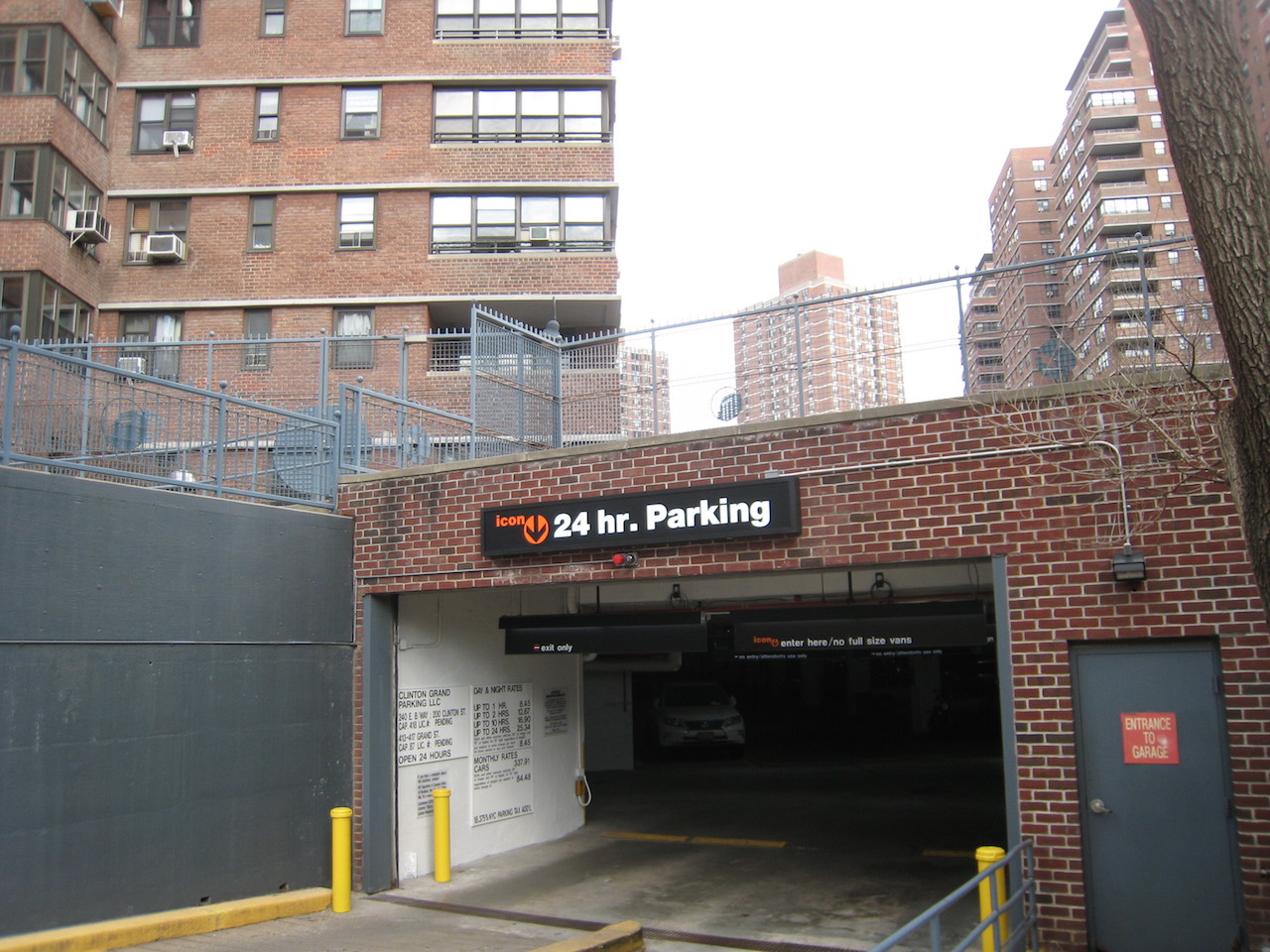
BY LESLEY SUSSMAN | In a surprise turn of events, opponents of a new valet parking system recently put into effect at the Seward Park Co-op’s garage and parking lot learned at last week that the system’s new operators may lack the proper city permits and that the co-op could be fined up to $25,000 as a result.
The co-op’s 11-member board of directors in January approved the hiring of Icon Parking Systems, a citywide garage valet parking service, to operate the complex’s 388-car garage and parking lot. The management board of the Lower East Side co-op said the change would keep parking prices below market rate, shorten the waiting list by increasing the number of spaces, and generate much-needed annual revenue.
Since then, an uncivil war has been raging at the four-building, 20-story co-operative along east Grand St. between a segment of car-owning shareholders who are against the valet parking system, and the co-op’s management board, which supports it. The garage is located at Clinton St. and E. Broadway.
The flap has not only involved shareholders who park in the garage and parking lot, but other shareholders at the 1,728-unit co-op, as well. These shareholders contend that the management board made the decision without any shareholder input.
In response, the co-op’s board has countered that the decision was made in good faith. The board says that not only will the new system result in increased income to help maintain the co-op without raising parking rates, but also open up parking space for the dozens of shareholders waiting for a space. There are currently 670 names on a parking waiting list.
The surprise announcement about possible permit violations was made by MyPhuong Chung, chairperson of the Community Board 3 Land Use, Zoning, Public & Private Housing Committee, at the committee’s meeting last Wednesday.
Chung told the co-op’s shareholders and her fellow committee members that based upon her “research” into the situation, she discovered that three required city permits to operate the new garage and parking lot may be missing.
“I researched the situation and the Department of City Planning told me that special permits were needed to make these changes,” she said. “According to the department of planning, these permits have not been filed with them, the Department of Buildings and the Department of Consumer Affairs.
“If this is true, the co-op could face fines of up to $25,000,” Chung noted. “I believe that they will have to pay for violations of permits for every day that they are operating.”
Among the violations that Icon may be committing, according to another Seward Park board member who lives in the co-op and requested anonymity, is that the garage has surpassed the number of cars — 418 — allowed under its current certificate of occupancy.
He also told this newspaper that, according to neighbors, the garage has been allowing single-day parking for motorists who do not live in the Seward Park Co-op. Both allegations have been strongly denied by Frank Durant, the co-op’s general manager.
“This is all pure nonsense,” Durant told The Villager the day after the C.B. 3 committee meeting. “We would never put the co-op at risk, and we would never allow Icon Parking Systems to operate illegally. Single-day customers aren’t being given spaces until Icon is certain that it has the proper permits.
“Icon is a reputable company that would not do anything that is illegal,” he continued. “Our attorneys reviewed everything, and if the city came in today to inspect the garage there would be nothing illegal that they would find.”
Durant went on to say that this issue was being manufactured by “people on the community board who live in this co-op that don’t want to give up their personal parking space.”
A reporter who visited the garage last week and asked if he could park his car there, although he wasn’t a resident, was given two different answers by parking attendants.
One told the reporter that parking was “for residents only,” while a second said, “if there was space,” he could park his car there.
Icon Parking Systems did not respond to calls for comment for this article, but did respond to the growing concerns by posting hand-written signs saying that the garage only allowed monthly parking.
Since the plan was first announced at the beginning of the year, outraged shareholders with garage and parking lot spaces have bitterly complained that they wanted to be able to park their own cars and not have to turn their keys over to valet parking attendants.
They also complained that the new system would squeeze more vehicles into the garage and parking lot so tightly, it would make it difficult for them to get in and out of their cars.
But some shareholders are slamming the new plan’s opponents as “selfish.”
One shareholder who asked not to be identified said that the valet parking system’s critics were “ignoring the fact that this service will increase revenues at the co-op by $200,000 to $300,000, without increasing parking rates, while also increasing the number of parking spaces available to the co-op.”
This point has also been made by the co-op’s board, whose members have responded that by hiring Icon to run the parking operation, the entire co-op will financially benefit from the additional revenues.
The atmosphere was electric at the C.B. 3 committee meeting as angry shareholders waited for management board representatives to make their case. But they were disappointed as co-op board representatives — including president David Pass — immediately left the meeting without comment after Chung made her stunning announcement.
Durant later told a reporter that, after the announcement, the board president “felt threatened” by the large turnout of shareholders, which was why he bolted from the meeting immediately afterward.
Angry shareholders also stormed out of the meeting, voicing some criticism as they exited about the way things were being handled that evening.
“Thanks for letting us know,” one shareholder sarcastically told committee members before leaving.
Chung responded that the hearing would be rescheduled once the permit issue was resolved, and that shareholders would have their chance to speak.
After the meeting, Dominic Berg, former C.B. 3 chairperson, said he was also a bit surprised by Chung’s disclosure.
“If this is true,” Berg said, “it surprises me since management probably was told that they needed a zoning change. Management has an obligation to make sure that they’re following the law.”
Last month, the Seward Park board circulated a detailed, seven-page “State of the Co-op” memorandum, outlining the co-op’s financial challenges — especially soaring real estate taxes — and the resulting need for new revenue sources, if monthly maintenance costs were to remain at their current low levels.
The memo pointed out that in the past six years, real estate taxes have risen by 125 percent — from $5.2 million to $11.7 million annually — while maintenance costs have risen by 14 percent. The board also noted that the complex’s reserve fund has been depleted to help cover operating expenses.
After the memo was issued, many shareholders who attended a meeting on the matter last month at the Manny Cantor Center seemed satisfied that the board had acted in good faith and that the revenue generated by valet parking would benefit the entire co-op. Others, however, continued to argue that the board’s deliberations lacked transparency.

































